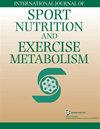A Food First Approach to Carbohydrate Supplementation in Endurance Exercise: A Systematic Review.
IF 3
3区 医学
Q2 NUTRITION & DIETETICS
International journal of sport nutrition and exercise metabolism
Pub Date : 2022-03-01
DOI:10.1123/ijsnem.2021-0261
引用次数: 5
Abstract
This systematic review analyzed whether carbohydrate source (food vs. supplement) influenced performance and gastrointestinal (GI) symptoms during endurance exercise. Medline, SPORTDiscus, and citations were searched from inception to July 2021. Inclusion criteria were healthy, active males and females aged >18 years, investigating endurance performance, and GI symptoms after ingestion of carbohydrate from a food or supplement, <60 min before or during endurance exercise. The van Rosendale scale was used to determine risk of bias, with seven studies having low risk of bias. A total of 151 participants from 15 studies were included in the review. Three studies provided 0.6-1 g carbohydrate/kg body mass during 5-45 min precycling exercise (duration 60-70 min) while 12 studies provided 24-80 g/hr carbohydrate during exercise (60-330 min). Except one study that suggested a likely harmful effect (magnitude-based inferences) of a bar compared to a gel consumed during exercise on cycling performance, there were no differences in running (n = 1) or cycling (n = 13) performance/capacity between food and supplemental sources. Greater GI symptoms were reported with food compared with supplemental sources. Highly heterogenous study designs for carbohydrate dose and timing, as well as exercise protocol and duration, make it difficult to compare findings between studies. A further limitation results from only one study assessing running performance. Food choices of carbohydrate consumed immediately before and during endurance exercise result in similar exercise performance/capacity responses to supplemental carbohydrate sources, but may slightly increase GI symptoms in some athletes, particularly with exercise >2 hr.耐力运动中碳水化合物补充的食物优先方法:系统综述。
本系统综述分析了耐力运动中碳水化合物来源(食物与补充剂)是否影响运动表现和胃肠道症状。检索了Medline、SPORTDiscus和引文,检索时间从创立到2021年7月。纳入标准为健康、活跃的男性和女性,年龄>18岁,调查耐力表现和从食物或补充剂中摄入碳水化合物2小时后的胃肠道症状。
本文章由计算机程序翻译,如有差异,请以英文原文为准。
求助全文
约1分钟内获得全文
求助全文
来源期刊
CiteScore
5.00
自引率
8.00%
发文量
50
审稿时长
6-12 weeks
期刊介绍:
The International Journal of Sport Nutrition and Exercise Metabolism (IJSNEM) publishes original scientific investigations and scholarly reviews offering new insights into sport nutrition and exercise metabolism, as well as articles focusing on the application of the principles of biochemistry, physiology, and nutrition to sport and exercise. The journal also offers editorials, digests of related articles from other fields, research notes, and reviews of books, videos, and other media releases.
To subscribe to either the print or e-version of IJSNEM, press the Subscribe or Renew button at the top of your screen.

 求助内容:
求助内容: 应助结果提醒方式:
应助结果提醒方式:


